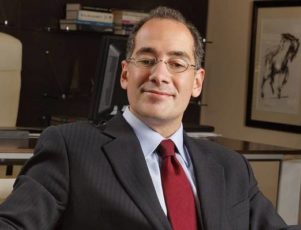Hisham el Khazindar, Co-founder and Managing Director at Qalaa holdings shows what he, and Egypt, are made of.
Hisham el Khazindar has gone from being a graduate in Cairo to running one of the Middle East’s leading investment firms, picking up an MBA from Harvard and work experience at places like Goldman Sachs. But how did this graduate from the American University in Cairo end up running a billion-dollar organization? First, look to exactly what he achieved along the way.
The man with the M&A plan
After graduating from the American University in Cairo in 1996 with a BA in Economics, Khazindar aptly started his career with EFG Hermes, a leading investment bank in the Middle East and North Africa (MENA) region. He spent his first three years there advising on key cross-border Mergers & Acquisitions (M&As), as well as carrying out high-profile equity offerings. Much like someone not accustomed to letting a good opportunity go to waste, Khazindar seized the chance to take a temporary transfer at Goldman Sachs in London in 1999 that lasted two years, continuing his work on M&As.
Khazindar returned to EFG Hermes as an Executive Director, advising on M&As and Initial Public Offerings (IPOs) – however, he was yearning for more. In 2001, Khazindar decided that the best way for him to progress would be to complete an MBA at Harvard Business School and, after graduating, Khazindar did not spend much time doing nothing. In 2004 he co-founded Citadel Capital (now known as Qalaa Holdings) and is now Managing Director of a $9bn private equity firm that controls investments in industries as varied as mining, oil and gas, cement, agri-food, transportation and logistics.
Perhaps due to his phenomenal progress, Khazindar sits on several boards in the region, from electrical and wind energy companies to eyewear providers. The list goes on: in total, Khazindar serves as director to six other companies and sits on the board of eight more. As if this wasn’t enough, he’s also earnt accolades including Young Global Leader in 2013 and being listed in the top 100 Young African Leaders.
Not an Inexperienced Public Orator
Khazindar is not unaccustomed to speaking in front of large audiences, having spoken at an Egypt: The Future conference and even given a TEDx talk, a local version of TED talks, about Egypt’s next 20 years. When he spoke at the TEDx in his native Egyptian Arabic, he occasionally brought in his perfect command of English to explain his ideas and largely did so with the eloquent ability of any other TED talk. He spoke of the importance of maintaining a reputation in business and of having to explain away any negative stereotypes that people can have of businessmen or entrepreneurs. This is something, he joked, that doctors and engineers have no problem with (jobs considered very prestigious in parts of the Arab world). Continuing to talk of the importance of the changes in Egypt and the necessity of grasping opportunities, Khazindar is certainly thinking of the impacts of his choices today in 10 or 20 years’ time.
In an interview with the Oxford Business Group, Khazindar kept away from delving into politics as much as possible, but he was unambiguous when it came to economic policies that the government would need to implement in order for economic recovery and growth to occur. These were, in no particular order, signs of lasting stability, appointment of ministers with proven economic ability, a workable constitution and articulation of clear economic objectives. As the interview moved onto financing tools and energy subsidies, Khazindar goes on to talk about the importance of SMEs and direct cash programs.
The future’s bright, the future’s…
Evidently, Khazindar knows what he’s talking about, he isn’t afraid to say what he thinks and he won’t let one success distract him from the next. His thinking is long term, for the progress of not just the Egyptian nation, its people and government, but of the entire region too. Something that Khazindar is quick to highlight is Egypt’s economically advantageous geographical location in Africa, in the middle of the Arab world and across the Mediterranean Sea from Europe; markets, he adds, with 1bn, 400m and 700m people, respectively. With such a large workforce to drive the economic growth (almost one in four Arabs in the Arab world is an Egyptian), it’s hard to see a future that isn’t better for Egypt.

